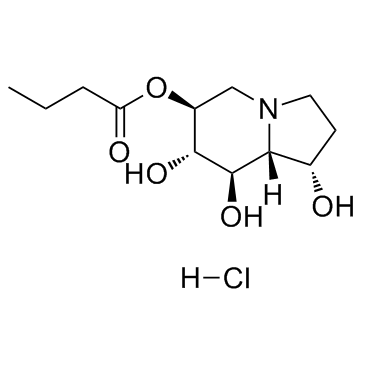Celgosivir hydrochloride (MBI 3253 (hydrochloride)) (Synonyms: MBI 3253 hydrochloride; MDL 28574 hydrochloride; MX3253 hydrochloride) |
| Katalog-Nr.GC32074 |
Celgosivir-Hydrochlorid (MBI 3253 (Hydrochlorid)) (MBI 3253-Hydrochlorid; MDL 28574-Hydrochlorid; MX3253-Hydrochlorid) ist ein ⋱-Glucosidase-I-Inhibitor; hemmt das Bovine Virus Diarrhoe Virus (BVDV) mit einem IC50-Wert von 1,27 μM im In-vitro-Assay.
Products are for research use only. Not for human use. We do not sell to patients.

Cas No.: 141117-12-6
Sample solution is provided at 25 µL, 10mM.
Celgosivir hydrochloride (MDL 28574A) is an α-glucosidase I inhibitor; inhibits bovine viral diarrhoea virus (BVDV) with an IC50 of 1.27 μM in in vitro assay.
Celgosivir is more effective (IC50=20 μM) than the parent molecule (IC50=254 ,uM) at causing the accumulation of glucosylated oligosaccharides in HIV-infected cells by inhibition of glycoprotein processing. Celgosivir exhibits potent antiviral activity against HIV-1 with an IC50 of 2.0±2.3 μM[1]. Bovine viral diarrhoea virus (BVDV) is a closely related virus of hepatitis C virus (HCV). Celgosivir inhibits BVDV with IC50 values of 16 and 47 μM in plaque assay and cytopathic effect assay, respectively[2]. Celgosivir inhibits DENV2 replication with an EC50 of 0.2 μM. The EC50 values against DENV1, 3 and 4 are less than 0.7 μM[3].
Celgosivir fully protects AG129 mice from lethal infection with a mouse adapted dengue virus at a dose of 50 mg/kg twice daily (BID) for 5 days and is effective even after 48 h delayed treatment. The protection by celgosivir is dose- and schedule-dependent and that a twice-a-day regimen of 50, 25 or 10 mg/kg is more protective than a single daily dose of 100 mg/kg. Pharmacokinetics studies of celgosivir in mice shows that it rapidly metabolizes to castanospermine[4]. During primary infection with a mouse-adapted DENV strain S221, mice shows increased viremia on day 3, yet 80% survived day 10 with virus completely cleared by day 8[3].
[1]. Taylor DL, et al. Inhibition of alpha-glucosidase I of the glycoprotein-processing enzymes by 6-O-butanoylcastanospermine (MDL 28,574) and its consequences in human immunodeficiency virus-infected T cells. Antimicrob Agents Chemother. 1994 Aug;38(8):1780-7. [2]. Whitby K, et al. Action of celgosivir (6 O-butanoyl castanospermine) against the pestivirus BVDV: implications for the treatment of hepatitis C. Antivir Chem Chemother. 2004 May;15(3):141-51. [3]. Watanabe S, et al. Dose- and schedule-dependent protective efficacy of celgosivir in a lethal mouse model for dengue virus infection informs dosing regimen for a proof of concept clinical trial. Antiviral Res. 2012 Oct;96(1):32-5. [4]. Rathore AP, et al. Celgosivir treatment misfolds dengue virus NS1 protein, induces cellular pro-survival genes andprotects against lethal challenge mouse model. Antiviral Res. 2011 Dec;92(3):453-60.
Average Rating: 5 (Based on Reviews and 3 reference(s) in Google Scholar.)
GLPBIO products are for RESEARCH USE ONLY. Please make sure your review or question is research based.
Required fields are marked with *




















